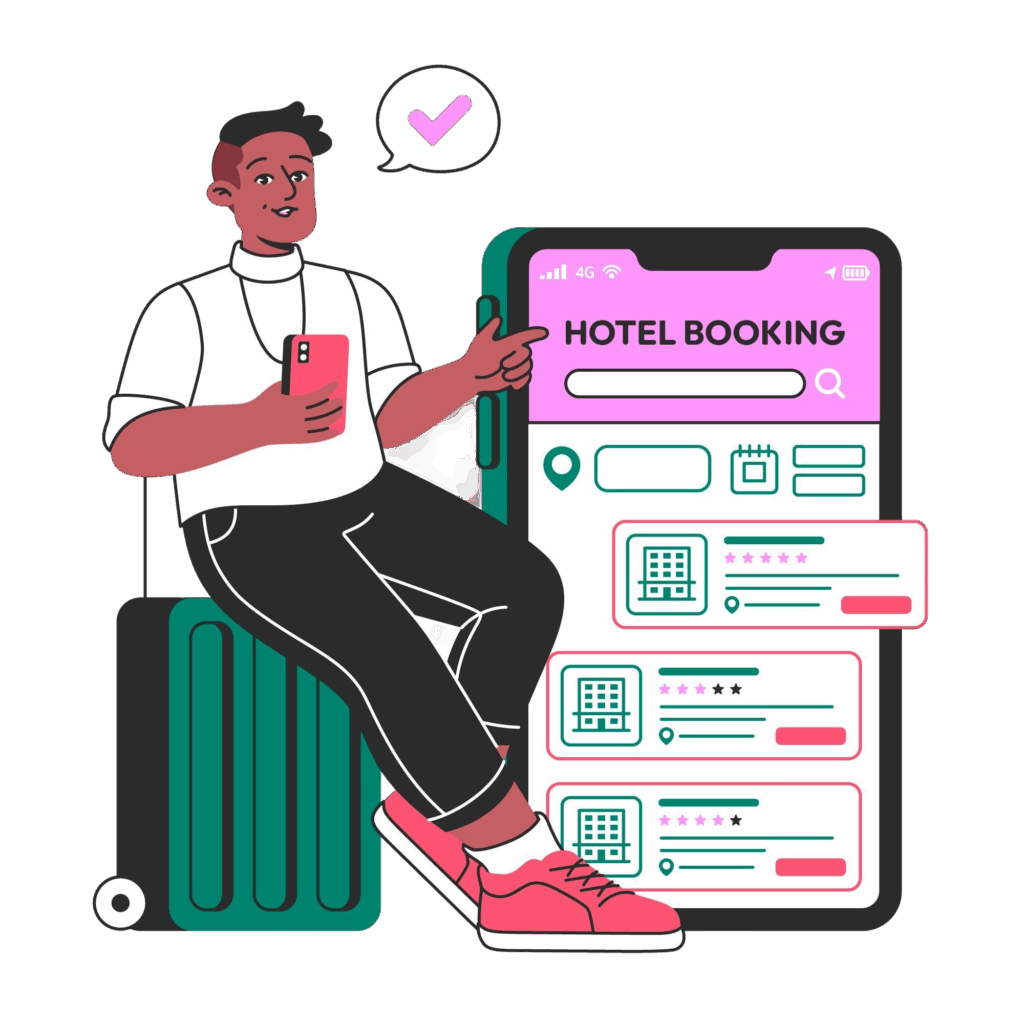
Table of Contents
Selecting the right hotel booking engine is one of the most critical decisions for any online travel agency (OTA). With the global online travel booking market projected to reach $833 billion by 2025, and 82% of travelers now booking accommodations online, choosing a booking engine features set that meets both current needs and future scalability requirements has become essential for competitive success.
Modern OTA booking systems must handle complex inventory management, real-time pricing updates, multi-currency transactions, and seamless user experiences across devices. However, with over 200 different booking engine providers in the market, identifying the truly essential features versus nice-to-have additions can be challenging for travel booking platform operators.
Industry Reality: OTAs using advanced hotel booking engines with comprehensive feature sets report 34% higher conversion rates and 28% lower cart abandonment compared to those using basic booking systems.
The foundation of any effective hotel booking engine lies in its ability to manage inventory in real-time. Without accurate availability data, OTAs face the costly problem of overbooking, which can damage reputation and result in significant financial losses.
Modern OTA booking systems require seamless connectivity with multiple suppliers, payment gateways, and third-party services. The quality of API integration directly impacts system performance and user experience.
| Integration Type | Essential Features | Business Impact |
|---|---|---|
| Supplier APIs | REST/SOAP support, XML/JSON formats, rate limiting | Inventory diversity, competitive pricing |
| Payment Gateways | PCI compliance, multi-currency, fraud detection | Revenue optimization, security |
| Channel Managers | Two-way sync, rate mapping, availability push | Distribution efficiency |
| CRM Systems | Customer data sync, booking history, preferences | Personalization, loyalty |
ZentrumHub’s Universal Hotel API provides comprehensive connectivity with over 500,000 properties worldwide, offering the robust integration capabilities that modern OTAs require for competitive advantage.
With 67% of travel bookings now completed on mobile devices, hotel booking engine features must prioritize mobile user experience. A mobile-first approach isn’t just about responsive design—it requires rethinking the entire booking flow for touch interfaces.
Sophisticated travel booking platforms require dynamic pricing capabilities that respond to market conditions, demand fluctuations, and competitive positioning in real-time.
Revenue Impact: OTAs implementing dynamic pricing through advanced booking engines report average revenue increases of 15-25% compared to static pricing models.
Global OTA booking system operations require comprehensive localization features that extend beyond simple language translation to include cultural preferences and local payment methods.
| Localization Feature | Technical Requirements | Business Benefits |
|---|---|---|
| Language Support | Unicode support, RTL languages, content management | Global market access, user experience |
| Currency Handling | Real-time rates, tax calculations, rounding rules | Price transparency, conversion optimization |
| Regional Preferences | Date formats, address fields, cultural customization | Local market penetration |
Modern travelers expect sophisticated search capabilities that help them find the perfect accommodation quickly. Hotel booking engine features must include comprehensive filtering and sorting options.
Security is non-negotiable for travel booking platforms. Modern booking engines must implement comprehensive security measures that protect both customer data and business operations.
As your OTA booking system grows, the booking engine must scale seamlessly to handle increased traffic and transaction volumes without compromising performance.
| Performance Metric | Industry Standard | Excellence Target |
|---|---|---|
| Page Load Time | Under 3 seconds | Under 1.5 seconds |
| API Response Time | Under 500ms | Under 200ms |
| Uptime Guarantee | 99.5% | 99.9%+ |
| Concurrent Users | 10,000+ | 100,000+ |
Data-driven decision making requires robust analytics capabilities built into the hotel booking engine. Modern OTAs need real-time insights into booking patterns, customer behavior, and revenue performance.
ZentrumHub’s booking engine incorporates all these essential features while providing additional advantages through our comprehensive travel technology platform.
The next generation of hotel booking engine features incorporates artificial intelligence to enhance user experience and optimize business operations.
| AI Application | Customer Benefit | Business Impact |
|---|---|---|
| Personalized Recommendations | Relevant property suggestions | Higher conversion rates |
| Dynamic Pricing | Competitive rates | Revenue optimization |
| Chatbot Support | 24/7 assistance | Reduced support costs |
| Fraud Detection | Secure transactions | Risk mitigation |
Emerging search technologies are reshaping how travelers discover and book accommodations, requiring travel booking platforms to adapt their search capabilities.
Future Trend: By 2025, an estimated 35% of travel searches will incorporate voice commands or visual elements, making these features essential for competitive positioning.
When evaluating hotel booking engine features, OTAs should use a systematic approach that considers both current needs and future growth requirements.
Successful OTA booking system implementation requires careful planning and execution. Following proven best practices ensures smooth deployment and optimal performance.
Selecting a hotel booking engine with the right feature set is crucial for OTA success in today’s competitive travel market. The features outlined in this guide represent the minimum requirements for modern travel platforms, while advanced capabilities like AI integration and personalization provide competitive advantages.
The most successful travel booking platforms combine comprehensive feature sets with reliable technical implementation and ongoing optimization. By focusing on user experience, security, performance, and scalability, OTAs can build platforms that not only meet current market demands but also adapt to future industry changes.
Ready to implement a comprehensive hotel booking engine with all essential features? Explore ZentrumHub’s complete travel technology platform, including our advanced booking engine, Universal Hotel API, and integrated solutions for online travel agencies. Contact our team today to schedule a personalized demonstration and discover how our technology can accelerate your OTA’s growth and success.
New OTAs should prioritize hotel booking engine features including real-time inventory management, mobile optimization, secure payment processing, and basic API integration capabilities. These core features provide the foundation for reliable operations and positive user experience.
Booking engine features like fast loading times, streamlined checkout processes, mobile optimization, and trust signals (security badges, reviews) can improve conversion rates by 25-40%. User experience optimization is the primary driver of booking completion.
Mandatory security features include PCI DSS compliance for payment processing, SSL encryption for data transmission, fraud detection systems, and GDPR compliance for data protection. These features protect both customers and business operations.
